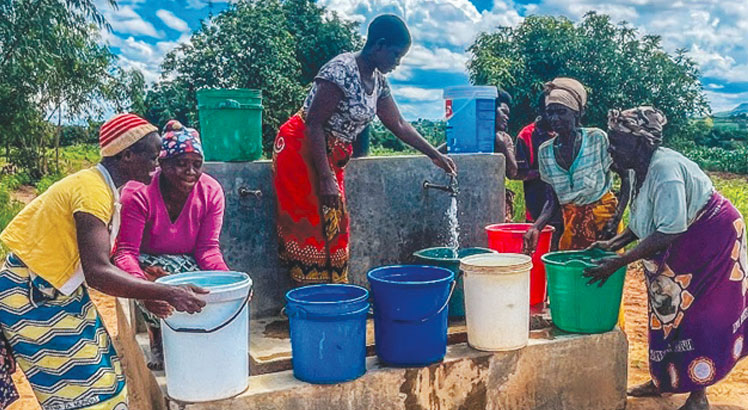Like many locations in Mzimba, Mateyo Ndhlovu Village is named after the Inkosana, the Ngoni traditional leader of the community on the outskirts of Ekwendeni Trading Centre.
The village sits within a kilometre of Lunyangwa River, the main source of raw water for Ekwendeni and Mzuzu City.
Until 2022, the rural community drank raw water from Lunyangwa despite several sanitation and hygiene gaps.
“We didn’t have safe drinking water. Lunyangwa provided water for our needs from drinking to cooking and washing. The water was free, but many died of cholera and other waterborne diseases,” says Inkosana Mateyo Ndhlovu.
The disease outbreaks were worse in the rainy season as the water became muddy and undrinkable, according to the village head.
First water kiosk to be installed in Inkosana Ndhlovu village
“We couldn’t use it for drinking or washing. We had to walk long distances to fetch water as we didn’t even have a borehole,” Ndhlovu narrates.
The village relies on farming and the community spent more time looking for water than tending to their fields.
“We are farmers with a lot of livestock, so we were sharing our only water source with cattle, goats and dogs,” he recalls.
This brought conflict in the village as people blamed each other for poor hygiene and disease outbreaks.
“My prayer was always for the government to give us a borehole that would bring peace to my village,” Ndhlovu says.
But come 2022, the community got more than what they hoped for.
Northern Region Water Board (NRWB) connected the community to a sustainable piped water system powered by clean energy at Ekwendeni.
Ndhlovu and his community now enjoy their right to safe drinking water, thanks to the 24.6 million euro Malawi NRWB Water Efficiency Project financed by the European Investment Bank through the Malawi Government.
Among other interventions in Ekwendeni, the project involved the construction of a concrete weir across the Lunyangwa River, increasing the raw water supply from 1.3 million litres to 8.1 million litres per day.
NRWB also upgraded the daily water treatment from a paltry 800 000 to 6.6 million litres and improved the 5.5-kilometre pipeline to Bobo and Chinungu tanks.
Additionally, the project upgraded 13 kilometres of distribution network, extending supply to Ndhlovu’s village where NRWB installed a communal water point.
Inkosana Ndhlovu says access to safe drinking water has reduced sanitation-related diseases and conflicts.
He brags: “I now sleep peacefully knowing that no one will wake me up in the middle of the night to take a patient to the hospital because they drank unsafe water.
“Imagine sleeping in peace knowing that the first thing we will do the next morning is to go and work our crop fields, not long walks to fetch water.”
Ndhlovu can sleep soundly, knowing he will not have to wake up at night to settle a water-related dispute if cattle soils a public well.
“This water has brought peace to my community,” he says with a smile.
Inkosana Ndhlovu has graduated from the communal water tap to his household’s prepaid connection.
“I wanted this feel-good life close to me. With a prepaid meter, I can buy water units without worrying about disconnections,” he says.
Several homesteads in the community have prepaid connections at their doorstep.
This has been accelerated by the government’s free new water connection programme.
“We are steadily running with the government’s vision of ensuring that everyone has access to potable water by 2030 and that no one is left behind in line with Sustainable Development Goal Six: Access to safe water and sanitation for all by 2030,” says NRWB chief executive officer Francis Munthali.
About 15 000 new prepaid connections dot Ekwendeni town and Mzuzu City, including Moyale Barracks.
Munthali narrates: “With prepaid meters, the project has greatly improved our relationship with customers and their water use efficiency as customers closely monitor usage.
“Constant fights and disagreements over water bills are now a thing of the past with customers on prepaid.”
Peace is unmistakable as the sun sets on Mateyo Ndhlovu Village, with its fading orange hues serenely calling it a day.
As villagers return home from their fields and diverse businesses, they calmly share the day’s big stories and plans for the next day, not quarrelling or asking: Whose animals soiled the well?
With the shared laughs, they have waved goodbye to water-related nightmares
The post Water for conflict resolution first appeared on The Nation Online.
The post Water for conflict resolution appeared first on The Nation Online.
 Moni Malawi
Moni Malawi 

